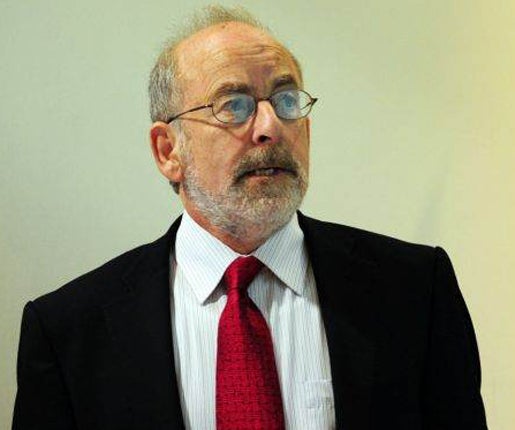Irish officials admit 'tens of billions' needed to calm Europe

Ireland edged ever closer to accepting a massive bailout channelled through its banks last night, as senior figures admitted for the first time that an international loan running into "tens of billions" would be needed to calm the economic jitters engulfing Europe.
Another day of painstaking negotiations, which began with an inspection of the country's books by a group of European Union and International Monetary Fund negotiators, ended with the announcement that reinforcements were needed to finalise a deal.
A further team of IMF banking experts has been summoned to Dublin to work out the details of the banking sector loan. Formal talks will begin today, completing one of the most dramatic weeks in Ireland's economic history. The talks will focus on measures to "support financial stability", the IMF said.
The Irish government hopes brokering a bailout channelled through its under-siege banks, which have seen huge withdrawals from nervous depositors since April, will be enough to stabilise the markets. It also hopes it will put an end to the threat of having an embarrassing bailout forced on the debt-laden state itself.
In the clearest admission to date that a huge cash injection was on the way, Patrick Honohan, governor of the Irish central bank, said yesterday he expected a package worth "tens of billions" of euros to emerge from the talks in the form of a "very substantial loan".
Mr Honohan said: "It will be a large loan because the purpose of the amount to be made available is to show Ireland has sufficient fire power to deal with any concerns of the market."
The Finance Minister Brian Lenihan last night moved the country closer to accepting a bailout, yet remained defiant in his tone. "I certainly don't feel a sense of shame about fighting hard for this country for the last two years to ensure its financial survival," said Mr Lenihan. "The big difficulty is that the banks grew to such a size that they became too unmanageable for the state. That's why we have to consider external assistance to stabilise our banking system."
David Cameron left open the possibility of a bilateral loan from Britain to ease Ireland's problems should an EU or IMF plan fail. The Chancellor, George Osborne, has already pledged British participation in any EU deal. Any support for Ireland in the form of a bilateral loan from Britain could prove politically explosive for Mr Cameron, as he confirmed to MPs yesterday that such a move would increase Britain's own record budget deficit.
The atmosphere in Dublin was downbeat, with many workers simply incredulous at how quickly the country, lauded just a few years ago for its breakneck economic growth, had fallen so far.
Ireland has yet to request financial support of any kind, with its Prime Minister, Brian Cowen, insisting repeatedly that the Irish state has enough money in its coffers to see it through well into next year. However, anger at the humiliation being heaped on the nation was aimed at Mr Cowen's ruling coalition yesterday.
During tense exchanges in the Dail, opposition parties called for the resignation of the government. Enda Kenny, leader of Fine Gael, said the government had failed to protect the country's sovereignty.
The apparent challenge to Ireland's hard-fought independence was also spelt out in passionate terms in newspaper editorials. The Irish Times asked if the sight of IMF officials marching towards the central bank was "what the men of 1916 died for: a bailout from the German Chancellor with a few shillings of sympathy from the British Chancellor on the side". It concluded: "There is the shame of it all."
Mr Cowen rebuffed any threat to sovereignty yesterday, amid claims that Germany would force Ireland to raise its very low corporation tax rate from 12.5 per cent as part of any bailout. He said: "There is no question of loss of sovereignty for Ireland. It will be the sovereign decision of the Irish government on behalf of the Irish people that will decide what shape any package would be. At the moment we are in the process of working out what the best options are."
Pressure has increased on the nation's banking system as it emerged savers and companies had made substantial withdrawals during August and September amid continuing fears over the prospects for the troubled institutions. Mr Honohan, the governor of the Irish Central Bank, admitted yesterday there had been a "steady drain of deposits".
Subscribe to Independent Premium to bookmark this article
Want to bookmark your favourite articles and stories to read or reference later? Start your Independent Premium subscription today.

Join our commenting forum
Join thought-provoking conversations, follow other Independent readers and see their replies